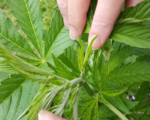Thailand has become the first country in Asia to legalize cannabis for medical and recreational purposes, but the move has also sparked a love-hate relationship with the plant. While some people welcome the benefits of cannabis for health, wellness, and economy, others fear the risks of abuse, addiction, and crime. How did Thailand go from being one of the strictest countries on drugs to being one of the most progressive?
Cannabis has a long history in Thailand, dating back to centuries ago, when it was used as a medicine, a food ingredient, and a cultural symbol. Cannabis was widely available and affordable, and it was integrated into various aspects of Thai society, such as religion, art, and cuisine. Cannabis was also a source of income and livelihood for many farmers, especially in the northern regions.

However, things changed in the 20th century, when Thailand came under the influence of the US-led war on drugs, which pressured the country to ban cannabis and other substances. In 1979, Thailand passed the Narcotics Act, which classified cannabis as a Category 5 narcotic, along with kratom, a local plant with psychoactive properties. The law imposed harsh penalties for possession, cultivation, and trafficking of cannabis, ranging from fines to imprisonment to death.
Thailand’s Reforms on Cannabis: From Medical to Recreational
Thailand’s attitude towards cannabis began to shift in the 21st century, as the country faced a public health crisis, an economic slowdown, and a social movement. Many people, especially patients and activists, advocated for the legalization of cannabis for medical purposes, citing its potential to treat various conditions, such as epilepsy, cancer, and chronic pain. They also argued that cannabis could boost the economy, create jobs, and reduce poverty.
In 2018, Thailand made history by becoming the first country in Asia to legalize cannabis for medical use, allowing patients, doctors, and researchers to access and produce cannabis products, such as oils, extracts, and pills. In 2020, Thailand expanded the law to allow the use of cannabis leaves, stems, and roots, as well as hemp, for food, cosmetics, and textiles. In 2021, Thailand took another bold step by delisting parts of the cannabis plant with low THC levels from the narcotics list, effectively legalizing cannabis for recreational use, subject to certain rules and regulations.
Thailand’s Challenges with Cannabis: From Regulation to Education
Thailand’s legalization of cannabis has also brought many challenges, such as regulation, education, and enforcement. The country has to balance the interests and expectations of various stakeholders, such as the government, the private sector, the civil society, and the public. The country also has to deal with the legacy and stigma of cannabis prohibition, as well as the influence and competition of the illicit market.
One of the main challenges is to regulate the production, distribution, and consumption of cannabis, and to ensure quality, safety, and transparency. The country has to establish clear and consistent rules and standards for cannabis products, such as labelling, testing, and packaging. The country also has to create a licensing and registration system for cannabis growers, sellers, and users, and to monitor and audit their activities.
Another challenge is to educate the public about the benefits and risks of cannabis, and to promote responsible and informed use. The country has to provide accurate and reliable information and guidance on cannabis, such as its effects, dosage, and interactions. The country also has to raise awareness and prevent abuse and addiction, especially among vulnerable groups, such as children, youth, and pregnant women.
Thailand’s Future with Cannabis: From Potential to Reality
Thailand’s legalization of cannabis has opened up many opportunities and possibilities for the country, such as health, wellness, and economy. The country has the potential to become a leader and a model for cannabis in Asia and beyond, and to tap into the growing global market for cannabis products and services.
Thailand has already seen some positive impacts and developments from cannabis legalization, such as increased access and affordability for patients, increased research and innovation for scientists, increased income and empowerment for farmers, and increased tourism and investment for businesses. Thailand has also seen some challenges and risks, such as legal uncertainty and inconsistency, social stigma and discrimination, and criminal activity and violence.
Thailand’s future with cannabis depends on how the country manages and harnesses the plant, and how the people embrace and respect it. Thailand’s cannabis legalization is a love-hate story, but it could also be a success story, if the country and the people work together to make it happen.
Maria Garcia is an award-winning author who excels in creating engaging cannabis-centric articles that captivate audiences. Her versatile writing style allows her to cover a wide range of topics within the cannabis space, from advocacy and social justice to product reviews and lifestyle features. Maria’s dedication to promoting education and awareness about cannabis shines through in her thoughtfully curated content that resonates with both seasoned enthusiasts and newcomers alike.








